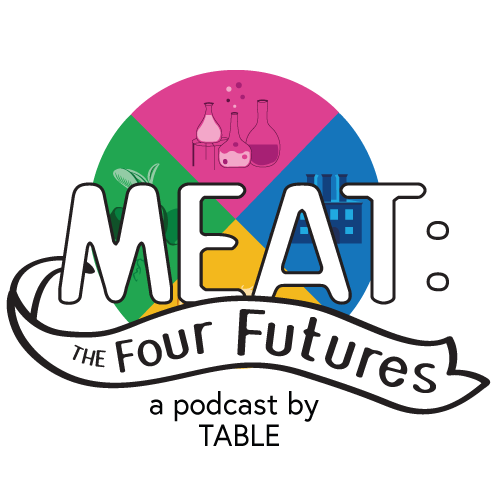Episode summary
Should we remove animals from agriculture and our diets altogether? What if all the land that produces animal feed now could instead produce human food--or be rewilded? Would this be a planet friendly future--or impoverished and unnatural?
In this fourth and final scenario: the plant-based no meat future, we explore the motivations, the evidence and the arguments for adopting a diet that centers and celebrates plants. We visit a vegan restaurant in Stockholm, Sweden; a vegan food tech company in Lagos, Nigeria; and an animal free farm outside of Reading in the United Kingdom.
But is dietary change at a societal scale unrealistic? Is this the most sustainable, ethical and efficient approach to eating and producing food? We explore all this and more.
Listen to each part

Part 1 - Why a plant-based future (13 minutes)
Jan Dutkiewicz, policy fellow at Harvard Law, makes the environmental and ethical case for a plant-based future, covering land use, protein and calorie conversion inefficiencies, methane emissions, social justice arguments, and the implications of putting forward a strong animal rights position.

Part 2 - Is meat natural? (9 minutes)
Amy Fitzgerald, professor at the University of Windsor in Ontario, Canada, pushes back on the ‘meat is natural’ narrative. She argues that while humans have eaten animals throughout history, the role that meat played in the past is very different than today.

Part 3 - Food of troublesome origin (10 minutes)
Meat the four futures producer Ylva Carlqvist Warnborg visits vegan restaurant Chou Chou in Stockholm, Sweden and speaks to the head chef Gustav Johansson, to find out why he thinks people should stop eating meat.

Part 4 - Leapfrogging meat (10 minutes)
Hakeem Jimo co-founded Veggie Victory 9 years ago, the first plant-based food tech company in Nigeria. He is also the new director of recently launched ProVeg Nigeria. We talk about his vision to produce nutritious and culturally appropriate plant-based meat substitutes to meet the growing demand for meat as the population is expected to double in Nigeria in the coming decades.

Part 5 - What works and what doesn't (9 minutes)
Susan Jebb, public health nutrition scientist, discusses what strategies work to get people to change their diets work, and which don’t. Turns out it’s easier to change the environments where people eat and purchase food, instead of changing individual behavior.

Part 6 - An animal free farm (13 minutes)
Is it possible to farm without using any animal inputs and any mineral fertilizers? Iain Tolhurst of Tolhurst Organic Farm, has spent the last 40 years proving not only that a veganic farm can function, but that it can thrive. Ylva Carlqvist Warnborg tours the farm, tastes the fresh produce, and witnesses the rich biodiversity and soil organic matter teeming with earthworms.
Part 7 - Where do we go from here (6 minutes)
Jan Dutkiewicz, policy fellow at Harvard Law, returns to talk about the scale of the challenge of getting people to change their diets, the aggressive pushback from the meat industry, and how the humble bean can be a building block for a better food system.
Scientific articles and related resources
Part 1 - Why a plant-based future
Article: Meatification and accumulation (Tony Weis, 2017)
Book: Animal Liberation (Peter Singer, 1975)
Article: The case for animal rights (Tom Regan, 1986)
Article: Existing cropland could feed four billion more by dropping biofuels and animal feed (Emily Cassidy et al., 2013)
Part 2 - Is meat natural?
Article: Why is meat so important in Western history and culture? A genealogical critique of biophysical and political-economic explanations (Robert Chiles and Amy Fitzgerald, 2018)
Article: The cultural hegemony of meat and the animal industrial complex (Nik Taylor and Amy Fitzgerald, 2014)
Part 3 - Food of troublesome origin
Restaurant: Chou Chou
Vegan blog: Jävligt gott (Gustav Johansson)
Part 4 - Leapfrogging meat
Restaurant: Veggie Victory
News: Launching ProVeg Nigeria (2023)
Part 5 - What works and what doesn't
Article: Trends in UK meat consumption (Cristina Stewart et al., 2021)
Article: The Effects of Environmental Sustainability Labels on Selection, Purchase, and Consumption of Food and Drink Products: A Systematic Review (Christina Potter et al., 2021)
Article: Restructuring physical micro-environments to reduce the demand for meat: a systematic review and qualitative comparative analysis (Filippo Bianchi et al., 2018)
Article: Interventions targeting conscious determinants of human behaviour to reduce the demand for meat: a systematic review with qualitative comparative analysis (Filippo Bianchi et al., 2018)
Part 6 - An animal free farm
Part 7 - Where do we go from here?
Summary report: Eat-Lancet (2019)
Article: The Vegan Protesters Spilling Milk in Supermarkets Are Right (Jan Dutkiewicz, 2022)
Article: How Do You Convince People to Eat Less Meat? (Jan Dutkiewicz, 2021)

